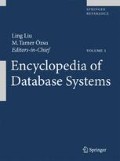Definition
Web harvesting describes the process of gathering and integrating data from various heterogeneous web sources. Necessary input is an appropriate knowledge representation of the domain of interest (e.g., an ontology), together with example instances of concepts or relationships (seed knowledge). Output is structured data (e.g., in the form of a relational database) that is gathered from the Web. The term harvesting implies that, while passing over a large body of available information, the process gathers only such information that lies in the domain of interest and is, as such, relevant.
Key Points
The process of web harvesting can be divided into three subsequent tasks: (i) data or information retrieval, which involves finding relevant information on the Web and storing it locally. This task requires tools for searching and navigating the Web, i.e., crawlers and means for interacting with dynamic or deep web pages, and tools for reading, indexing and comparing the textual content of pages; (ii) data or information extraction, which involves identifying relevant data on retrieved content pages and extracting it into a structured format. Important tools that allow access to the data for further analysis are parsers, content spotters and adaptive wrappers; (iii) data integration which involves cleaning, filtering, transforming, refining and combining the data extracted from one or more web sources, and structuring the results according to a desired output format. The important aspect of this task is organizing the extracted data in such a way as to allow unified access for further analysis and data mining tasks.
The ultimate goal of web harvesting is to compile as much information as possible from the Web on one or more domains and to create a large, structured knowledge base. This knowledge base should then allow querying for information similar to a conventional database system. In this respect, the goal is shared with that of the Semantic Web. The latter, however, tries to solve extraction à priori to retrieval by having web sources present their data in a semantically explicit form.
Today's search engines focus on the task of finding content pages with relevant data. The important challenges for web harvesting, in contrast, lie in extracting and integrating the data. Those difficulties are due to the variety of ways in which information is expressed on the Web (representational heterogeneity) and the variety of alternative, but valid interpretations of domains (conceptual heterogeneity). These difficulties are aggravated by the Web's sheer size, its level of heterogeneity and the fact that information on the Web is not only complementary and redundant, but often contradictory too.
An important research problem is the optimal combination of automation (high recall) and human involvement (high precision). At which stages and in which manner a human user must interact with an otherwise fully automatic web harvesting system for optimal performance (in terms of speed, quality, minimum human involvement, etc.) remains an open question.
Recommended Reading
Ciravegna F., Chapman S., Dingli A., and Wilks Y. Learning to harvest information for the Semantic Web. In Proc. 1st European Semantic Web Symposium, 2004, pp. 312–326.
Crescenzi V. and Mecca G. Automatic information extraction from large websites. J. ACM, 51(5):731–779, 2004.
Etzioni O., Cafarella M.J., Downey D., Kok S., Popescu A.M., Shaked T., Soderland S., Weld D.S., and Yates A. Web-scale information extraction in KnowItAll: (preliminary results). In Proc. 12th Int. World Wide Web Conference, 2004, pp. 100–110.
Author information
Authors and Affiliations
Editor information
Editors and Affiliations
Rights and permissions
Copyright information
© 2009 Springer Science+Business Media, LLC
About this entry
Cite this entry
Gatterbauer, W. (2009). Web Harvesting. In: LIU, L., ÖZSU, M.T. (eds) Encyclopedia of Database Systems. Springer, Boston, MA. https://doi.org/10.1007/978-0-387-39940-9_1172
Download citation
DOI: https://doi.org/10.1007/978-0-387-39940-9_1172
Publisher Name: Springer, Boston, MA
Print ISBN: 978-0-387-35544-3
Online ISBN: 978-0-387-39940-9
eBook Packages: Computer ScienceReference Module Computer Science and Engineering

